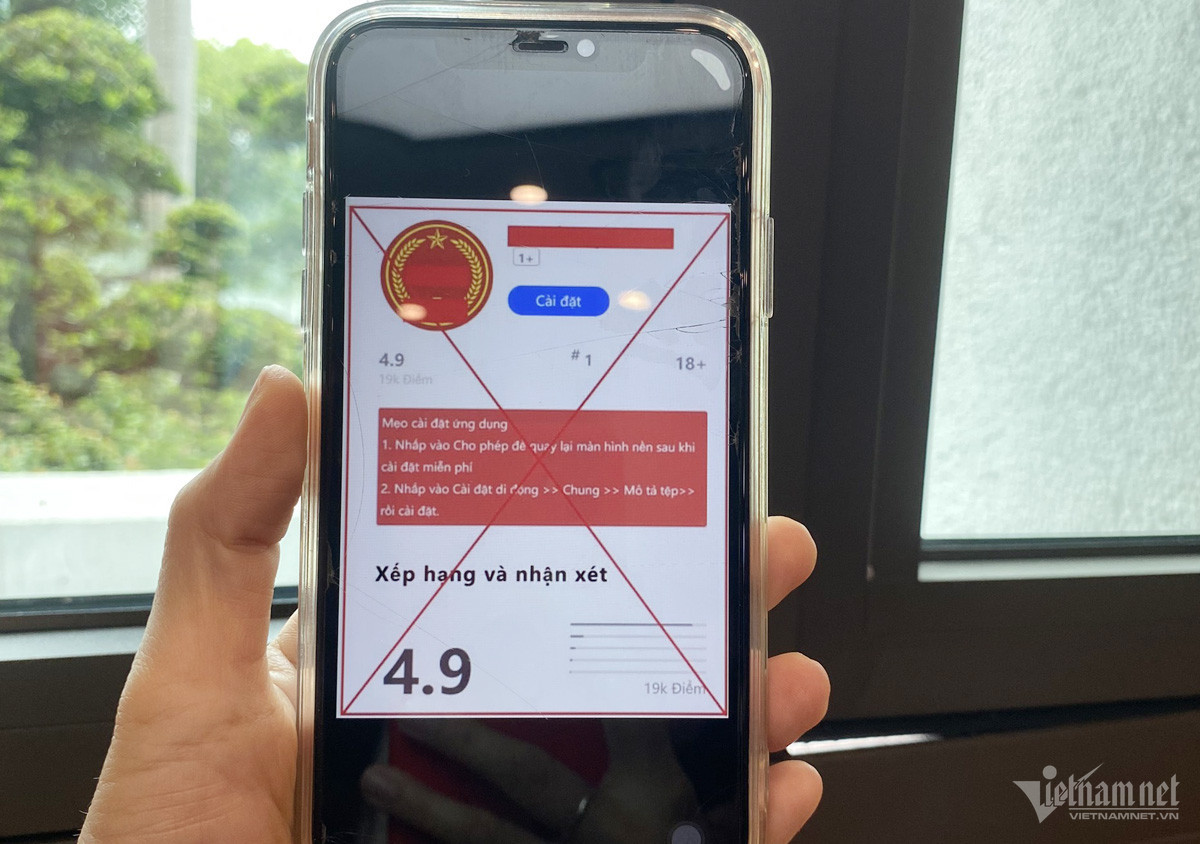
Scammers are increasingly using fake apps to deceive users. (Illustrative image: T. Hien)
Below are 5 online scams that the Information Security Department has recently recommended Vietnamese Internet users be wary of: Impersonating bank employees to trick people into giving verification instructions to steal assets. Taking advantage of the regulation requiring biometric data updates on online banking applications, effective from July 1st, in recent days, some individuals have impersonated bank employees to proactively contact users and commit fraud to steal assets. Specifically, when contacting users of banking services, the impersonators ask victims to provide personal data such as home address, photos of both sides of their citizen ID card, and bank account information. In many cases, the scammers also entice people to make video calls to collect the victim's voice, facial expressions, and gestures. After successfully stealing data, the perpetrators can easily log into banking and online payment applications and carry out money transfer transactions from the victim's account, thus misappropriating assets. In addition, some perpetrators trick people into downloading fake applications containing malware via links attached in messages. Once the victim downloads this application to their phone, the perpetrators can easily monitor the victim's actions on their device, thereby exploiting more sensitive information.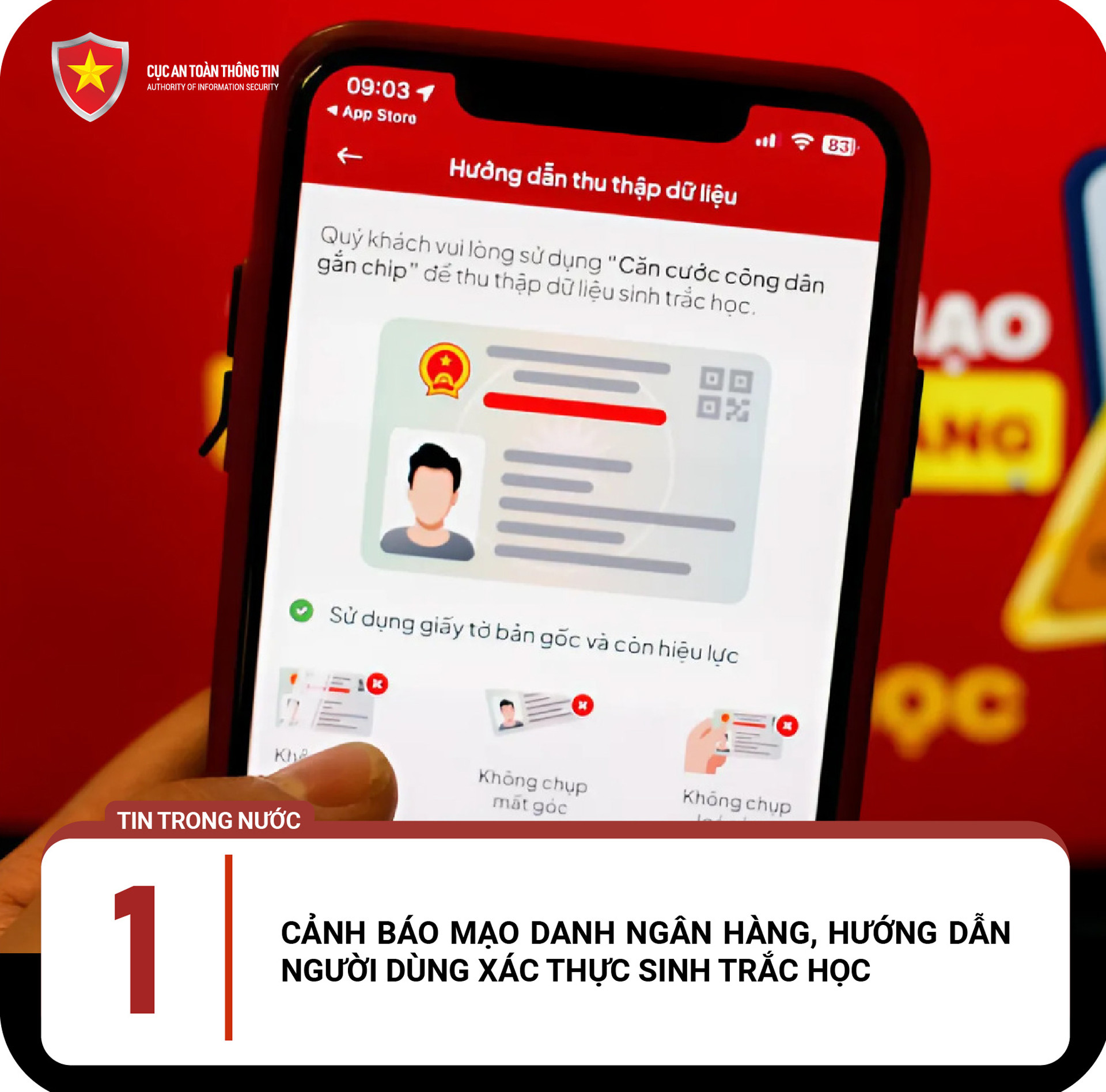 In response to the aforementioned new scam, the Information Security Department advises people to be vigilant when receiving messages or calls instructing them to update biometric data. When contacted by individuals claiming to be bank employees or police officers, people should verify their identity. People should also avoid clicking on strange links and installing applications from unknown sources. Speaking with a VietNamNet reporter, information security expert Vu Ngoc Son commented that scammers are often very quick to capitalize on trending events and phenomena; they quickly devise scam scenarios exploiting these events to maximize the chances of users falling into their trap. For example, in the past, when mobile network operators standardized subscriber information, or during the personal tax filing period, many individuals impersonated network operators or tax authorities to trick people into installing similar fake applications. “To prevent this, users should call the bank's customer support center themselves using the officially published phone numbers, avoid installing unfamiliar applications, and not provide their OTP passwords,” expert Vu Ngoc Son recommended. A resident of Trung Hoa ward, Cau Giay district ( Hanoi ) recently lost 1.2 billion VND due to installing a fake online public service application . The scammer sent the fake application via a link attached to a message, contacting the victim and informing them that their account verification was faulty and they needed to install the application for remote support. When the victim followed the instructions, the scammer gained control of the device and stole money from the victim's bank account.
In response to the aforementioned new scam, the Information Security Department advises people to be vigilant when receiving messages or calls instructing them to update biometric data. When contacted by individuals claiming to be bank employees or police officers, people should verify their identity. People should also avoid clicking on strange links and installing applications from unknown sources. Speaking with a VietNamNet reporter, information security expert Vu Ngoc Son commented that scammers are often very quick to capitalize on trending events and phenomena; they quickly devise scam scenarios exploiting these events to maximize the chances of users falling into their trap. For example, in the past, when mobile network operators standardized subscriber information, or during the personal tax filing period, many individuals impersonated network operators or tax authorities to trick people into installing similar fake applications. “To prevent this, users should call the bank's customer support center themselves using the officially published phone numbers, avoid installing unfamiliar applications, and not provide their OTP passwords,” expert Vu Ngoc Son recommended. A resident of Trung Hoa ward, Cau Giay district ( Hanoi ) recently lost 1.2 billion VND due to installing a fake online public service application . The scammer sent the fake application via a link attached to a message, contacting the victim and informing them that their account verification was faulty and they needed to install the application for remote support. When the victim followed the instructions, the scammer gained control of the device and stole money from the victim's bank account.  Notably, despite repeated warnings from authorities about the scam involving the installation of fake public service software, people are still being defrauded of billions of dong. The Information Security Department advises citizens not to access suspicious links. When receiving notifications related to the use of public service software, citizens should only download applications from official sources such as the AppStore and CH Play app stores. In case of detecting any signs of fraud, citizens should quickly report it to the authorities. A woman living in Chơn Thành town ( Bình Phước province) was recently swindled out of over 2.3 billion dong by a scam involving a modified version of the "Easy Job, High Salary" fraud scheme. Specifically, the perpetrators befriended the victims via Telegram, then introduced them to a work-from-home job – 'listening to designated songs, logging in, and voting for singers', with a promised reward of 35,000 VND per vote. After agreeing to participate, downloading the fake Zing MP3 application, and paying a deposit to complete the tasks as instructed by the perpetrators, the victims were defrauded of all the money they transferred.
Notably, despite repeated warnings from authorities about the scam involving the installation of fake public service software, people are still being defrauded of billions of dong. The Information Security Department advises citizens not to access suspicious links. When receiving notifications related to the use of public service software, citizens should only download applications from official sources such as the AppStore and CH Play app stores. In case of detecting any signs of fraud, citizens should quickly report it to the authorities. A woman living in Chơn Thành town ( Bình Phước province) was recently swindled out of over 2.3 billion dong by a scam involving a modified version of the "Easy Job, High Salary" fraud scheme. Specifically, the perpetrators befriended the victims via Telegram, then introduced them to a work-from-home job – 'listening to designated songs, logging in, and voting for singers', with a promised reward of 35,000 VND per vote. After agreeing to participate, downloading the fake Zing MP3 application, and paying a deposit to complete the tasks as instructed by the perpetrators, the victims were defrauded of all the money they transferred. 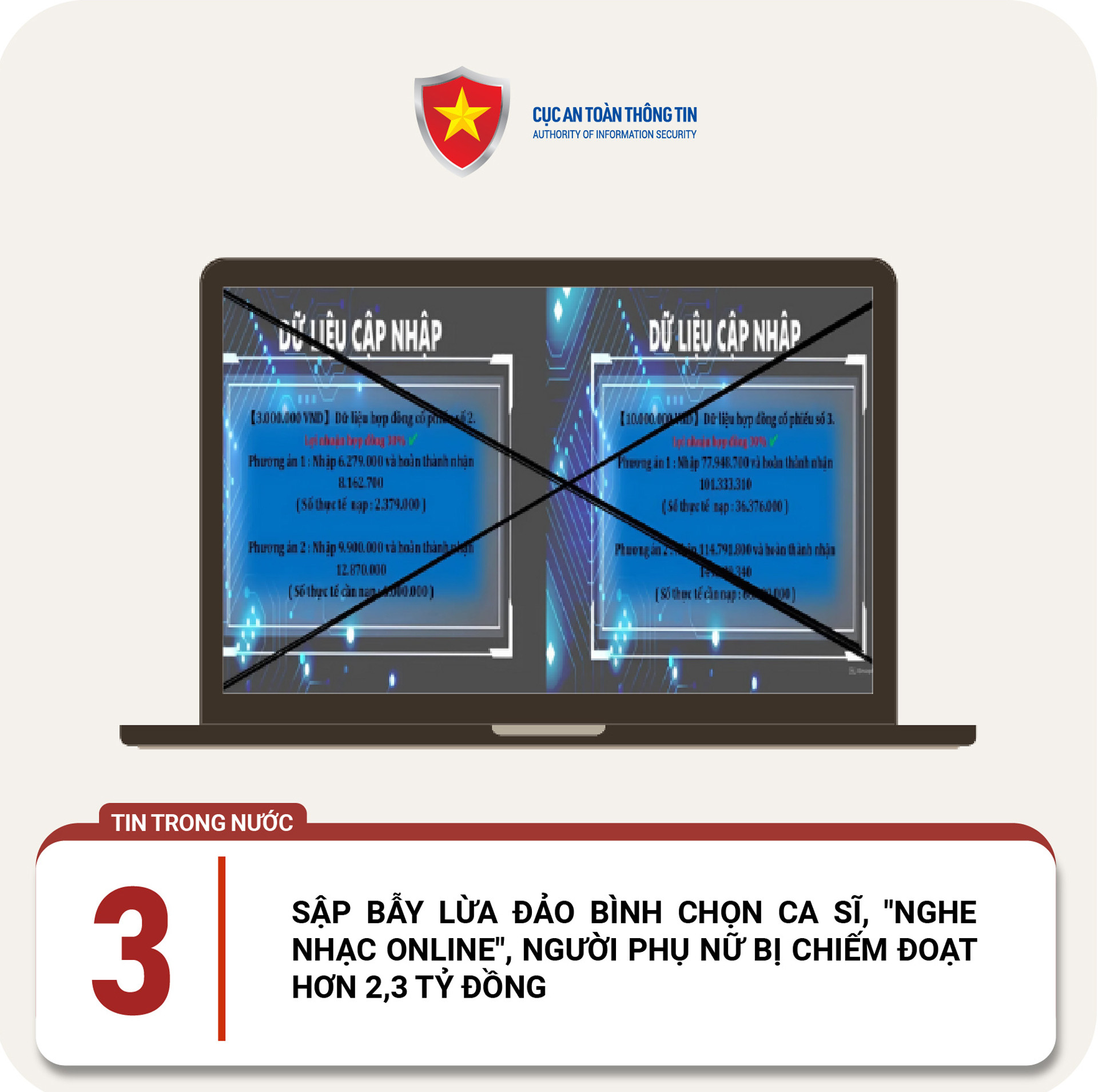 Advising people to be wary of offers of "easy work, high pay," experts from the Information Security Department also cautioned citizens against transferring deposit money or paying participation fees without verifying the identity of the perpetrator. Upon noticing signs of fraud, people should save conversations and information about the perpetrator and then report it to the local police to promptly prevent the scam. Impersonating the Anti-Fraud Center to steal assets: According to the Information Security Department, the Ontario Provincial Police (Canada) recently issued a warning about scams impersonating the Canada Fraud Center (CAFC). Specifically, the perpetrators first impersonate bank employees, credit card providers, or e-commerce platforms to approach users, informing them that their accounts have been hacked and showing signs of suspicious transactions. Subsequently, the perpetrators send emails bearing the CAFC logo to increase their credibility, requesting victims to provide personal data, banking information, and conduct transactions to steal money.
Advising people to be wary of offers of "easy work, high pay," experts from the Information Security Department also cautioned citizens against transferring deposit money or paying participation fees without verifying the identity of the perpetrator. Upon noticing signs of fraud, people should save conversations and information about the perpetrator and then report it to the local police to promptly prevent the scam. Impersonating the Anti-Fraud Center to steal assets: According to the Information Security Department, the Ontario Provincial Police (Canada) recently issued a warning about scams impersonating the Canada Fraud Center (CAFC). Specifically, the perpetrators first impersonate bank employees, credit card providers, or e-commerce platforms to approach users, informing them that their accounts have been hacked and showing signs of suspicious transactions. Subsequently, the perpetrators send emails bearing the CAFC logo to increase their credibility, requesting victims to provide personal data, banking information, and conduct transactions to steal money.  Furthermore, scammers are increasingly impersonating investigators from CAFC, targeting victims and promising to help them recover their lost money. They will request information from victims to aid in the investigation, thereby appropriating their assets. To prevent this, the Cybersecurity Department advises citizens to be vigilant when receiving messages or emails from any organization; not to provide personal data; not to transfer money upon request; and to verify messages and emails through official online portals and phone numbers. Warning about scams via WhatsApp : WhatsApp is a popular online chat application widely used by people of all ages worldwide. Therefore, it is also a very convenient platform for scammers to commit fraud and steal assets. Through this online chat platform, perpetrators are using various fraudulent tactics such as impersonating relatives or friends; notifying people about participating in prize giveaways; tricking them into upgrading their applications; requesting verification codes, etc.
Furthermore, scammers are increasingly impersonating investigators from CAFC, targeting victims and promising to help them recover their lost money. They will request information from victims to aid in the investigation, thereby appropriating their assets. To prevent this, the Cybersecurity Department advises citizens to be vigilant when receiving messages or emails from any organization; not to provide personal data; not to transfer money upon request; and to verify messages and emails through official online portals and phone numbers. Warning about scams via WhatsApp : WhatsApp is a popular online chat application widely used by people of all ages worldwide. Therefore, it is also a very convenient platform for scammers to commit fraud and steal assets. Through this online chat platform, perpetrators are using various fraudulent tactics such as impersonating relatives or friends; notifying people about participating in prize giveaways; tricking them into upgrading their applications; requesting verification codes, etc.  To prevent scams via WhatsApp, the Information Security Department advises people to be vigilant when receiving messages from strangers; do not click on links attached in messages, do not provide personal information, and do not transfer money as requested by strangers. When receiving messages asking for loans, people should carefully verify the identity of the sender through the information on the profile of those accounts.
To prevent scams via WhatsApp, the Information Security Department advises people to be vigilant when receiving messages from strangers; do not click on links attached in messages, do not provide personal information, and do not transfer money as requested by strangers. When receiving messages asking for loans, people should carefully verify the identity of the sender through the information on the profile of those accounts. 


![[Photo] Two flights successfully landed and took off at Long Thanh Airport.](/_next/image?url=https%3A%2F%2Fvphoto.vietnam.vn%2Fthumb%2F1200x675%2Fvietnam%2Fresource%2FIMAGE%2F2025%2F12%2F15%2F1765808718882_ndo_br_img-8897-resize-5807-jpg.webp&w=3840&q=75)










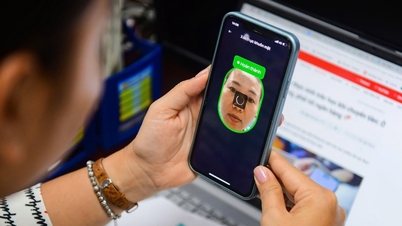







































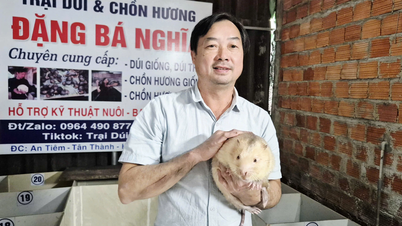

































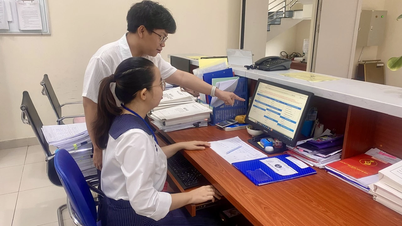



















Comment (0)